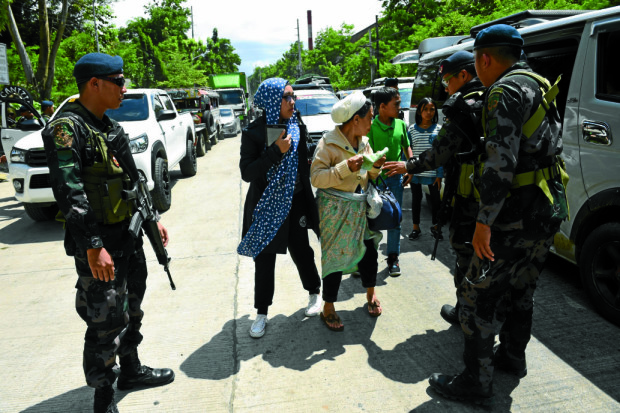Groups back strong action in Marawi but wary of martial law

Police officers check evacuees from Marawi at a checkpoint by the entrance of Iligan City in of Mindanao on May 24, 2017. President Rodrigo Duterte warned that martial law would be “harsh” and like a dictatorship, after imposing military rule in the south to combat Islamist militants. (Photo by TED ALJIBE / AFP)
Civil society groups and nongovernment organizations were unanimous in supporting government’s strong action against local terrorists ensconced in Marawi City. But they were wary of President Rodrigo Duterte’s placing the entire island of Mindanao under martial law.
The groups aired their concern over possible human rights abuses following Duterte’s statement that he would be “harsh” in implementing martial law in Mindanao, which he said would be no different from the martial law imposed by the Ferdinand Marcos in 1972.
“Let us be clear, the Maute Group-Abu Sayyaf and/or ISIS wannabes operating in Marawi must be stopped. The burning of civilian facilities, such as the UCCP school, must be strongly condemned,” Renato Reyes, secretary-general of the leftist umbrella group Bagong Alyansang Makabayan said in a statement issued on Wednesday.
“However, we oppose Duterte’s martial law declaration because it is open to all sorts of abuses by state security forces notorious for human rights violations,” he added. “It is a blanket endorsement of so many abuses arising from warrantless arrests, searches and seizures and the filing of trumped-up charges. It threatens to unleash more violence against the people.”
Suara Bangsamoro expressed concerns about reports that aerial and artillery bombing would be conducted by the government troops to eradicate the Maute Group in Marawi.
Article continues after this advertisement“We fear for the lives of the civilians who might get caught in the crossfire. We fear for the effects of war to the civilian population,” Jerome Succor Aba, Suara Bangsamoro chairman, said.
Article continues after this advertisementHe added that the Duterte administration should learn from what happened when Moro guerrilla fighters attacked Zamboanga City in September 2013, wherein displacement, death, hunger and poverty continue to affect the civilians even after a year.
Josua Mata of the labor group Sentro condemned what he labeled as an “atrocious attack” on the people of Marawi. But he said the declaration of martial law was “a heavy-handed response to the situation that even the AFP now claims is under control.”
“The real possibility of a state of martial law being utilized for counter-insurgency and the suppression of civil liberties, including workers’ and trade union rights, is a well-founded fear of our people due to our two-decade experience of dictatorship. While the 1987 Constitution has significantly constrained the latitude of abuse a state of martial law may entail, a pliant Congress does not inspire institutional confidence,” Mata said.
The groups also said military operations would not provide long-term solutions to terrorism and other problems in Mindanao.
“Mindanao has always been subjected to countless numbers of military operations, state of emergency declarations, and all-out war pronouncements; and we have yet to find peace, because poverty, landlessness, discrimination and widespread oppression still persist, and the real instigator of terrors are the state and the men in uniform themselves,” the indigenous peoples group Katribu said in a statement.
Lito Ustarez, vice president for external and political affairs of the labor group Kilusang Mayo Uno, called on Duterte to instead use his “strong influence” in Midanao to engage in diplomatic talks with the Maute Group, together with Moro and other religious leaders, local executives and influential elders to come up with agreements that would peacefully resolve the conflict.
“The various armed conflicts in Mindanao are rooted in decades-old problems of poverty, inequality, discrimination and violations of the right to self-determination. These will ultimately require more than just a military solution. Martial law is not the answer,” Reyes added.
Former Rep. Rene Magtubo, chairman of the Partido ng Manggagawa, said the martial law declaration was “a disproportionate response to a localized problem.”
“It is like using a gun to kill a fly when a swatter will suffice,” he said. “The lesson of Philippine history is that martial rule is a problem not a solution as it leads to abuses and dictatorship.” /atm
RELATED VIDEO